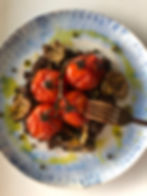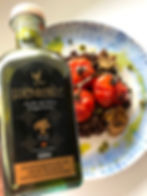Like a Virgin...Or is it? It's time take a long, hard look at Olive Oil!

Fun fact: if you touch an olive, it is not considered as 'virgin' or 'extra virgin'. And yet UK supermarkets can still sell it as so!
Earlier in 2019 I was invited on a press trip to Spain, by the London Office of ICEX (the Institute for Foreign Trade and Investment, which is a division of the Spanish Ministry of Industry Trade and Tourism).
Linares being situated in 'Jaen', the famous olive oil region of Spain. The trip was organised by this government office to share the story of the olive oil harvested in traditional methods for the last 2000 years, for maximum quality, while not compromising the local environment or it's biodiversity.
And here began the awakening of my true appreciation of the olive, it's farmers and the liquid gold they produce.
In this post I would like to share my learnings and a some recipes using the olive oils I selected directly from the olive grove factory producing it. I would like to tell you about the incredible, unknown story if the regions farmers, and the impact they have on the industry.
My initial surprise was that everything the 'good' olive oils I had been buying until this point were referred to as 'Lamp Oil' here. Because the standard is just so low, and as we continue to blindly buy it, there is no need for the supermarkets to change and offer something better. Supply and demand - it's time to demand better.
Forget the bland, slippery vehicle used to coat salad leaves, these oils are an ingredient in their own right and worthy of the best bread to taste it with. The flavour is more powerful than I have tasted before, and in comparison, the olive oil I once reached for in my local supermarket, simply doesn't compare to the incredible range I have now been enlightened to.
5 things you probably don't know and should know about olive oil
1 - Olive is classified as 'Virgin' or 'Extra-Virgin' based on whether the olive has touched the ground, been harvested by hand into a net or has been picked at the optimum time.
2 - The region of Jaen produces 20% of the global olive oil on the market. Many of the oil produced here is sent to stabilise olive oil, even in Italy.
3 - Olives that have fallen to the ground take in moisture from rain or dew because of the whole in the top where the stalk would have been. This causes a diluted pulp and substandard product
4 - The majority of olive oil labelled as Virgin and Extra Virgin in the UK is substandard and often wolf in sheeps clothing (lamp oil in Extra Virgin Bottle as it were)
5 - The best oils are produced between October and November. Good oil can be created beyond this time, however the weather conditions are prime to growing good olives with hearty flavours in this period
Producing the Best
The olive oils I selected have been purchased based on my newly acquired knowledge of harvesting methods. One of them is the current title holder of 'Best Olive Oil in Spain' - who could pass that up? I was also drawn to another oil from the same factory, a beautiful oil with plenty of character and a clear crowd pleaser on during tasting on the day. The others we picked up from the Picualia factory, the market leader for olive oil exports in the country.
I have created the following recipes to show off this liquid gold in all the glory it deserves, and keep reading to find out what we got up to in the region creating 20% of the entire market of the world's olive oil .
- Recipe -
Whole Roasted Tomatoes & Crunchy Artichokes with Lentils
& Fuernoble Extra Virgin Olive Oil

Ingredients
- Organic Tomatoes - the best available
- Ready roasted artichokes in olive oil (you can find these in the fresh isle at Waitrose next to olives etc)
- Puy lentils - used the ready cooked microwave pack
- 1 Tablespoon tomato puree
- Vegetable stock disslved into half the amount of water
- Salt
- Black Pepper
- 2 teaspoons capers
The Olive Oil Garnish
Exceptional quality olive oil - for this recipe, I recommend Fuernoble - the most awarded olive oil in Spain - it is currently only available to UK residents online or directly via their olive grove. It has notes of tomato with a spicy, sharp edge and herby flavours. Perfectly paired with the capers, tomatoes and artichokes. And compliments the lentils well with the earthy rooted notes.

Method
- Place the tomatoes and artichokes into an ovenproof dish with a good splash of olive oil
- Roast until the tomatoes are softening and the artichokes have a brown colour
- Add the lentils to a saucepan with the stock, tomato puree, black pepper, salt and capers. Heat through until the sauce reduces and turn off the heat
- Place the lentils onto the place and top with the tomatoes and artichokes, add further capers if you wish and drizzle with the olive oil generously
Spanish Olive Oil - Sustainability and BioDiversity
Let's take a look at some facts and stats about Jaen, it's incredible olive producers and how the sustainable methods of this area are far superior to many of it's counterparts around the world.
Cultivating Sustainability

The focus of my trips was to examine the harvesting methods of the olive oil produced within the factories. Last year I read a very sobering article about the methods for producing olive oil in some of the world's top olive oil producing countries selling into the UK market.
The article shared devastating detail on the effects of certain methods used on the environment, biodiversity and sustainability. Many of the regions wildlife including nesting birds were killed in the process, not to mention the waste material during the production of the oil.
To harvest olive oil, many factories cause damage to the wildlife living in the trees, as well as the land around the factory due to pollution from waste. To preserve and respect the biodiversity, very specific harvesting methods must be adopted. In the region of Jaen, the preferred method is old fashioned. But it works, and their olive oil is still considered one of the world's preferred among olive oil experts.
Respecting Environmental Balance

In the region of Jaen, Spain, I was delighted to learn that, not only have they adopted harvesting methods that cause little to no damage to the environment, nor loss of life for wildlife, the factories have created methods to alleviate stress on the environment with unique recycling methods with each element of the olive being reqused either as fertiliser or is left for local animals to forage as food.
Nothing is going to waste in the groves we visited, but are actually helping to promote sustainable uses of by-products which is repurposed for good.
Special machines are used to 'hug' the tree, which is given a shake, the olives are then collected in the net placed below. Any that do not fall are collected by hand and will add an more intense flavour. These olives will become Extra Virgin, the olives in the net will be the Virgin olive oil. This is as opposed to other methods which involve machinery grabbing the olives from the trees, causing damage.

Specialist equipment is used to cause the least damage possible to shake the tree to remove the olives
What is incredible difficult, is understanding how sustainable a product is, and how much harm producing them can have on our planet. We can't exactly hop on a plane to see. But knowing that sustainability is placed at the heart of the production of them should be our priority when selecting what we buy. How far can we go to ensure we cause no harm at all? That in itself is impossible, but personally, I would rather put my money where my mouth is, and when it comes to olive oil recommendations, it's the region of Jaen in Spain that will be on my lips, and their olive oil, on my table.

Content Notice
The content of this blog is owned by Kim Lewis, Food Writer & Blogger for Life by Ms. Lewis, unless otherwise stated. Please contact me directly for permission to feature the content of this blog and it's photography in your publications. Opinions are my own.
Features
Fuernoble Olive Oil
Picualia Olive Oil
Thank you's & credit
Special thanks to:
- Anna Expósito and Jose Miguel Navarro of Camara Linares within The Chamber of
Commerce Culture Division of Spain for hosting us on our press trip to Jaen
and the privelidge of training in your prestigious olive oil school
- Torsten Schaeffer, of Dishes Delicious for the image contributions - www.dishes-delicious.defacebook.com/DishesDeliciousBlogtwitter.com/dishdelicious
- The many great olive oil artisans we met in Linares for sharing your story and olive oils with us

















